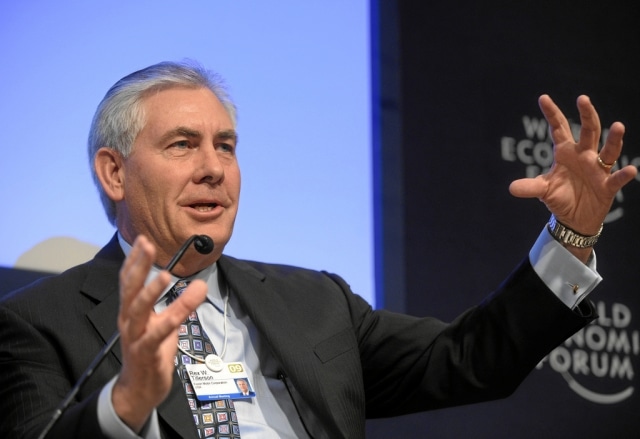Rex Tillerson, chief executive of ExxonMobil, the world’s largest oil company, has called for European governments to support fracking, despite being called out as a ‘nimby’ last year.
Speaking at the World Gas Conference in Paris this week, he claimed that the large number of wells already fracked in the US and Canada have proven that the technology is safe.
However, just last year, Tillerson joined a lawsuit citing fracking’s consequences in order to stop the construction of a 160-foot water tower as it would harm the value of his $5 million home in Texas.
The claimants also stated that the water tower’s intended operations – to sell water to the local fracking firms – will create “a noise nuisance and traffic hazards”.
Tillerson eventually dropped out of the suit a few months later and, after continuing battles between his neighbours and the company building the water tower, the completion of the project was eventually given the go-ahead.
More recently, ExxonMobil faced criticism after its shareholders rejected proposals to add independent directors with climate change expertise to their boards.
From Coal to Gas
Leading European oil and gas companies have been championing calls for global price on carbon emissions this week in order to shift production away from coal to natural gas.
Over the past few years energy companies have seen a gradual shift in the mix of their energy production. Shell CEO Ben van Beurden, has said that his company has changed from “an oil-and-gas company to a gas-and-oil company.”
Shell and Total began producing more gas than oil in 2013 and 2014 respectively, and ExxonMobil’s gas output rose to about 47 percent of total production last year, up from 39 percent six years ago.
These calls come as oil and gas companies face growing pressure to take action on climate change from fossil fuel divestment campaigns and policy makers who want to bring down their nations’ carbon emissions.
But Tillerson, along with Chevron, said that he only intend to support a carbon tax if real consensus emerges in the US.
Climate Change and Poverty
Tillerson has repeatedly rejected the accuracy of climate models that seek to predict the outcomes of rising temperatures, and has warned that hastily adopting carbon limits based on these models could have costly long-term consequences for shareholders. ExxonMobil is also well known for its involvement in funding climate denial think tanks.
The coal industry has also attempted to fight back against the call for more natural gas by arguing that coal production is essential in order to lift people out of poverty in developing countries.
The London-based World Coal Association (WCA) has met with officials from India to Indonesia, Pakistan, the Philippines and Malaysia to convince them of this policy and get them to support coal-fired power generation in any potential agreements made at the UN climate change conference in Paris this December.
Fracking Outlook
So, does this mean more fracking? Not necessarily. The president of the International Gas Union, Jerome Ferrier, announced at the World Gas Conference in Paris this week that there will not be a US-style shale gas revolution in Europe.
He put this down to the reluctance of European governments: there is resistance in Poland and the UK, moratoriums in Germany and Bulgaria, and a ban in France.
He told the BBC that “the future of gas does not depend on shale gas – there is enough conventional gas [to meet demand] for more than a century.”
Photo: World Economic Forum via Flickr
Subscribe to our newsletter
Stay up to date with DeSmog news and alerts







